The Caruthers’ Group has a diverse set of interests that span both fundamental research and innovative educational methods. Prof. Caruthers believes in the mission of a land grant university to help promote the general welfare of the nation by a balanced portfolio of research and education, where both the research and educational programs need to be innovative and of the highest quality. It order to address this challenge, the Caruthers’ Group is currently pursuing four major activities.
Mechanics of Glassy Polymers.
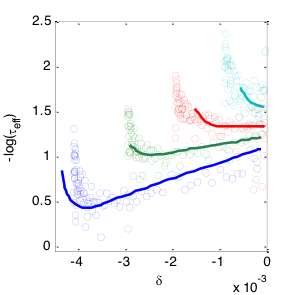
Polymeric materials are among the most important engineering materials is use today, being used in a wide variety of automotive, aerospace, medical, electronic and consumer products. An important class of engineering polymers are glassy polymers, where the glassy state has no long range order like a liquid but it is stiff like a solid. Unlike more traditional materials like metals and ceramics, the mechanical behavior of polymeric glasses is quite sensitive to both temperature and time. A quantitative description of the nonlinear mechanical behavior of glassy polymers remains a considerable technological challenge, where an effective model of the nonlinear, time-dependent response is needed if glassy polymers are to achieve their full potential as engineering materials in 21st century applications. The Caruthers’ group has developed the state-of-the-art constitutive models to describe the nonlinear, time dependent thermo-mechanical behavior of glassy polymers. Additional Information.
The Kinetics of Olefin Polymerization.
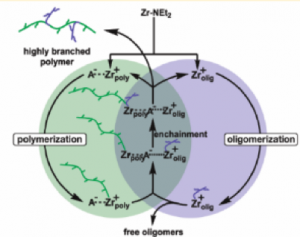
Polyolefins are the largest volume of polymers that are produced industrially and included polyethylene and polypropylene. The monomer for the polymerization can be either ethylene, propylene or an alpha-olefin like 1-hexene or 1-octene, where a catalyst is typically used to accelerate the polymerization and control the molecular architecture of the resulting polymer. A major advance in polymerization catalysis has been the introduction of single site catalysis vs. traditional Ziegler-Natta catalysis that have multiple catalytic sites. The Caruthers’ group in collaboration with the research group of Prof. Mahdi Abu-Omar http://www.chem.ucsb.edu/abuomargroup/ have developed quantitative polymerization models for a variety of single site polymerization catalysts. These models define the state-of-the-art in polymerization modeling, where the models explicitly account for all molecules in the system and use the full complement of experimental data including monomer consumption via 1H NMR, evolution of the molecular weight distribution via GPC, end group analysis by 2H NMR and co-monomer composition via 13C NMR. Series of catalysts with systematic change in molecular architecture have been investigated to begin developing structure-activity relationships – the Holy Grail in polymerization catalysis. Additional Information.
Motorsport-STEM (M-STEM) Program. Prof. Caruthers is the founding Director of Purdue’s M-STEM education program. M-STEM is an integrated STEM program that uses the excitement of motorsports to engage young people in STEM education. The program has two components: the evGrandPrix electric go-kart event that is held at the Indianapolis Motor Speedway each May as part of the Indy500 festivities and a series of hands-on experiments that can be used in a high school physical science class that connect basic physical science concepts with electric go-kart technology.
The evGrandPrix 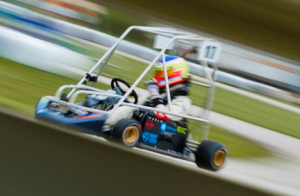 is an education event where student teams design, construct and test electric go-karts and then race the go-karts at the Indianapolis Motor Speedway just prior to Pole Day of the Indy500. The evGrandPrix is much more than a race, where overall scoring is based upon a combination of race placement, energy efficiency, engineering design and community outreach. The event has both a high school and a collegiate division, where student teams from across Indiana, the USA and Europe compete.
is an education event where student teams design, construct and test electric go-karts and then race the go-karts at the Indianapolis Motor Speedway just prior to Pole Day of the Indy500. The evGrandPrix is much more than a race, where overall scoring is based upon a combination of race placement, energy efficiency, engineering design and community outreach. The event has both a high school and a collegiate division, where student teams from across Indiana, the USA and Europe compete.
The high school division engages a wide variety of students, including students that will pursue a BS Engineering/Technology degree or an Associate Degree in a variety of topics like advanced manufacturing, robotic technology, supply chain management or matriculate directly to work with an industry certification, e.g. welding. High School teams are organized like small manufacturing companies that include engineering, technology, manufacturing, project management, advertising/marketing, logisitics, communications and art/design – all working together for a common goal.
The collegiate division has a similar objective as the high school division, providing students the opportunity to deploy material they learn in the classroom in an exciting environment as part of one of the world’s premier sporting events. The standard electric division of the Collegiate evGrandPrix has been at the Indianapolis Motor Speedway since 2009. In 2018 there will be a new Collegiate Remote Controlled Division, where student will race remote controlled electric go-karts and in 2019 there will also be an autonomous Division – these new divisions will allow collegiate student to innovate at the highest level on some of the most exciting technology of the 21st century.
Additional information on the evGrandPrix.
High School Hardware Store Science Experiments. A key objective of the M-STEM program is to use the evGrandPrix to better engage students in the STEM disciplines. Of particular concern is the fact that the manufacturing industries in the US are in need of a STEM enabled workforce as the baby boom begins to retire in mass. A key challenge is to engage all students in STEM, not just those students that will pursue an engineering or science degree at the university, since basic STEM skills are needed for a variety of career pathways.
The technology in the electric go-karts has been deconstructed, 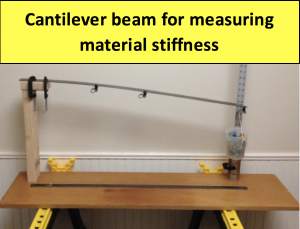 where almost all of the topics covered in a high school physical science course can be connected to the go-karts. This provides a real world context of how basic science concepts are connected to actual engineered products. Student first build their experimental apparatus using material found in any hardware store (thus they learn basic making skills that are the foundation for a manufacturing career), then they are taught how to do one experiment and analyze that data and finally they are asked a series of inquiry-based, ‘what-if’ questions where they can explore using their recently constructed apparatus. The suite of Hardware Store Science Experiments provides a balanced collection of Science, Technology, Engineering and Math experiences that engage students that have a variety of career objectives. Additional Information.
where almost all of the topics covered in a high school physical science course can be connected to the go-karts. This provides a real world context of how basic science concepts are connected to actual engineered products. Student first build their experimental apparatus using material found in any hardware store (thus they learn basic making skills that are the foundation for a manufacturing career), then they are taught how to do one experiment and analyze that data and finally they are asked a series of inquiry-based, ‘what-if’ questions where they can explore using their recently constructed apparatus. The suite of Hardware Store Science Experiments provides a balanced collection of Science, Technology, Engineering and Math experiences that engage students that have a variety of career objectives. Additional Information.
Professional MS Program: Polymer Science and Engineering Concentration 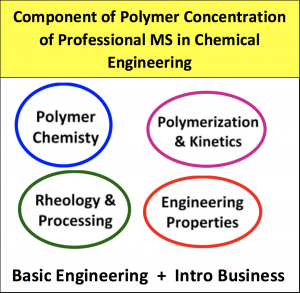
Polymers are one of the most important products of the chemical industry; however, many students never have the chance to be introduced to polymers as part of their undergraduate education. This is particularly true of students that graduate with a BS degree in chemistry. Caruthers in collaboration with other Purdue Chemical Engineering faculty is currently offering a polymer concentration as part of its Professional MS Program in Chemical Engineering. The program is designed so that student that come from a chemistry program are qualified to take the program, where there are often significantly enhanced employment opportunities for students with a MS in Chemical Engineering vs a BS in Chemistry. In addition to polymer science and engineering courses the Professional MS students take some basic engineering courses, introduction to business and a summer project course. Additional Information.